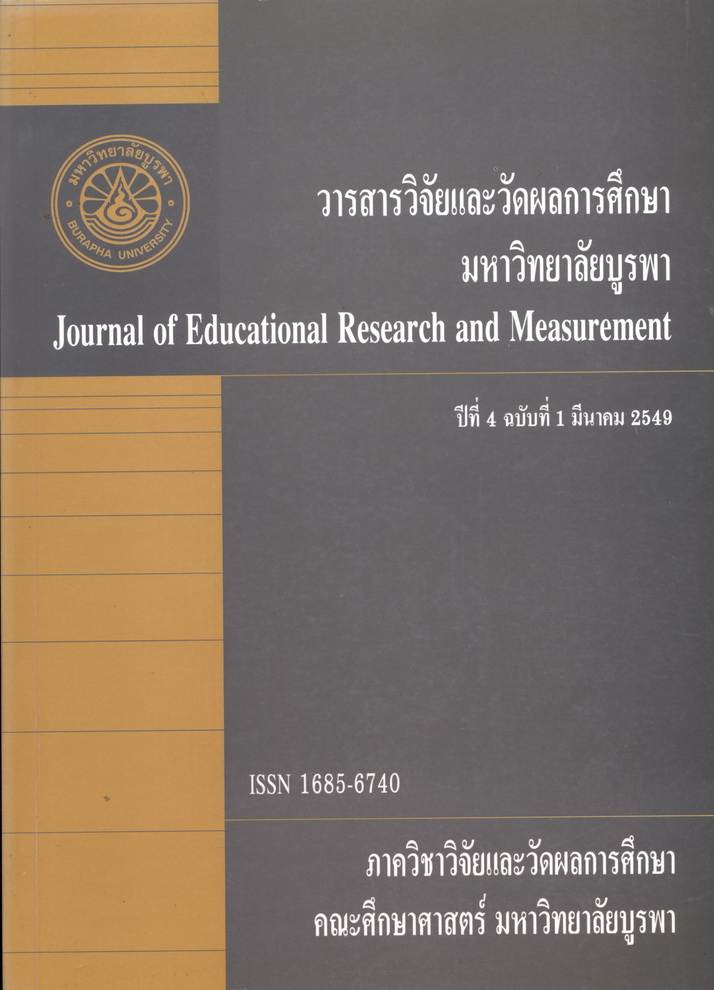ความไมซื่อสัตย์ทางวิชาการของนักศึกษามหาวิทยาลัย
Main Article Content
Abstract
ความไมซื่อสัตยทางวิชาการของนักศึกษามีความสัมพันธโดยตรงกับคุณธรรมของบัณฑิต การที่นักศึกษาทุจริต ในการสอบแสดงถึงปญหาของมหาวิทยาลัยในเรื่องคุณภาพของการวัดผลการศึกษา ทําใหการประเมินความสามารถของนักศึกษา ไมตรงตามสภาพที่แทจริง นักศึกษาที่ทุจริตในการสอบอาจมีความสามารถต่ํากวามาตรฐาน เมื่อสําเร็จการศึกษาออกไปสู สังคมแลวไมสามารถปฏิบัติงานไดตามมาตรฐานวิชาชีพ การวิจัยนี้มีวัตถุประสงคเพื่อศึกษาลักษณะของพฤติกรรมไมซื่อสัตย ทางวิชาการที่นักศึกษาเคยกระทําในมหาวิทยาลัย โดยการสํารวจนักศึกษามหาวิทยาลัยของรัฐแหงหนึ่ง จํานวน 583 คน จาก 6 สาขาวิชา ใหนักศึกษารายงานตนเองวาเคยหรือไมเคยกระทําพฤตกรรมไม ิ ซื่อสัตยทางวิชาการ ไดแก การทุจริต ในการสอบ การลอกแบบฝกห ัด ความไมซอสื่ ัตยในการทํารายงาน และการสรางขอม ูลเท็จ การวิเคราะหขอมูลใชคาสถิติ รอยละคาเฉลี่ยสวนเบี่ยงเบนมาตรฐานการทดสอบคาไคสแควร คาสัมประสิทธิ์สหสัมพนธั และการถดถอยพหุคูณ ผลการวิจัยชี้ใหเห็นวานักศึกษาประมาณรอยละ 97 รายงานวาตนเคยกระทําพฤติกรรมไมซื่อสัตยทาง วิชาการ สวนใหญเปนการลอกแบบฝกห ัด รองลงไปเปนการท ุจริตในการสอบ การเปลี่ยนแปลงขอมลู และไมซ ื่อสัตย ในการทํารายงาน นักศึกษาชายมีแนวโนมที่จะยอมรับและกระทําความไมซื่อสัตยทางวิชาการมากกวานักศึกษาหญิง ระดับคะแนนเฉลี่ยสะสมมีความสัมพันธทางบวกกับพฤติกรรมไมซื่อสัตยทางวิชาการ ความตั้งใจกระทําความไมซื่อสัตย ระดับคะแนนเฉลี่ยสะสม และการคลอยตามกลุมเพื่อน สามารถรวมกันทํานายพฤติกรรมไมซื่อสัตยทางวิชาการได รอยละ 13 การวิจัยครั้งนี้เสนอแนะวาผ ูบริหารมหาวทยาล ิ ัยควรกําหนดประมวลจริยธรรมทางวชาการ ิ เพอควบค ื่ มพฤต ุ ิกรรม ไมซื่อสัตยทางวิชาการของนักศึกษา และนักวัดผลการศึกษานาจะศกษาว ึ ิธีการวัดความคลาดเคลอนจากการท ื่ จรุ ิต เพื่อทําให คะแนนจากการวดถั ูกตองย ิ่งขึ้น
ACADEMIC DISHONESTY AMONG UNIVERSITY STUDENTS
Academic dishonesty among students is directly related to the integrity of graduates. Cheating by students exacerbates the university’s problems regarding the quality of educational measurement; student ability cannot be accurately evaluated. Students who cheat probably have less competence, and are unable to work at a professional standard level after graduating. The purpose of this research, then, was to study the characteristics of dishonesty behavior used by students at the university level. The sample consisted of 583 students from six disciplines studying at a state university. The students themselves reported whether they engaged in any of four types of academic dishonesty: cheating at a test, copying others’ assignments or homework, reproducing or cheating in doing reports, and fabrication or making up data. The results indicated that 97 percent of students reported dishonest behavior. Most of them revealed they copied others’ assignments, cheated at a test, made up data, and cheated when doing reports, respectively. Male students are likely to accept and conduct dishonesty more than female students. Grade point average (GPA) was positively correlated to academic dishonesty behavior. Intension, GPA, and following peer group accounted for 13 percent of the total variance of academic dishonesty. It is suggested that university administrators ought to propose honor codes to control the unethical behavior of students. Those who are in the field of measurement should think about how to determine and monitor the assessment error introduced by cheating, cheating error, in order to derive more accurate scores from the measurement process.

